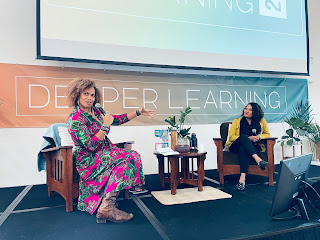Deeper Learning Den Talk - Decolonising ourselves with Aisha Bain and Manasa Yeturu
 |
| Aisha Bain and Manasa Yeturu |
This talk is for you - for your body, your mind, your soul, your spirit, your past selves, and the you that is becoming. This talk is raw and real. It is about rejecting what no longer serves us, about the things we don't talk about because they are filled with pain, and yet create barriers to our healing and to our unbounded possibilities. This talk is a rejection of white supremacy, we are not doing anything that gets in the way of the liberation of our people and of everybody. This talk grapples with our leadership that comes from love and rage, the place of being with the complexities around us and within us - yet not to be consumed by them. This talk is deep belly laughter, joy, celebration. Come talk with us. See you soon!
Speaker Bios
Manasa Yeturu. Educator. Dancer. Poet. Designer. Diver. Those are just some of Manasa Yeturu’s life descriptors. She is currently a lecturer at Stanford's Hasso Plattner Institute of Design and co-lead of d.School’s renowned multi-disciplinary program Design For Extreme Affordability. Manasa has 15+ years of experience working the intersection of social justice + design, from being part of Teach for India’s team in their startup years to leading government innovation initiatives alongside Kamala Harris's team to building financially inclusive services for underserved women all around the world; she is no stranger to working on complex problems with the ethos of equity & collective care at the centre of her design work. She believes in a world where we can all lift each other up and dance with the community in the process.
Aisha Bain is a black feminist warrior, social justice activist, smasher of patriarchy, and uses her imposing height and incredible stank eye to silence mansplaining in an instant.
Aisha is an inspiring leader with over 15 years of experience in senior leadership and has managed programs and partnered with community organisations responding to violence against women and girls in prevention, mitigation, service provision, advocacy, and policy change in more than a dozen countries. As a filmmaker, artist and author, Aisha has a particular passion for using creative tools and media to further social justice movements and to raise the voice and visibility of women and girls within those movements.
Opening line. Let's decolonise this talk! Decolonise our language. Say what you mean, mean what you say. We got you. We are enough just as we are. We need to widen our safety net. Aisha shared her experiences throughout the pandemic and beyond and talked about how for the first time she shared her challenges widely and learned the power of expanding the safety net. Inviting people in.
Who takes care of the caretakers? It is important to hold, but also we must hold each other. Aisha talked about being angry for so long and that anger is fuel. But also realised that she was exhausted and the rage was impossible to control. Not just leading from a place of rage but also a place of love.
All the things that go unsaid. And what might have been possible if we actually said what we mean. Aisha decided after the pandemic that she would say what she thinks. She talked about racialised internalised oppression and how that changes what we say and how we behave. Say what you want to say and feel what you want to feel.
We are enough just as we are. At some point, the world tells you are too much and how you should behave, particularly as a woman. Work from a place of compassion. Manasa shared a story where she also highlighted the importance of taking the time to tell people how much she appreciated them.
We don't have to love everyone and we don't have to be loved by everyone. It's okay to have our people.
As an aside, this was the first time I had been in a talk where people clicked fingers in response to comments and it was rather beautiful. Sweeping generalisation warning - I can't help feeling that Americans do the whole earnest sharing thing in a way we don't tend to do in New Zealand and whilst the Kiwi in me initially bristled at the overt acts of vulnerability and support, what I soon reflected on is if this was actually a colonial construct that we Kiwis have (or I have)? Is our critique of tall poppies also a colonial construct? I don't know, but I'm going to think about it. I goddam loved this talk and the messages I heard and the lessons I learned.
Takeaways for educators - how might we encourage teachers and students to decolonise themselves as well as educators focusing on decolonising education. How do we support students to say what they mean and mean what they say?
All the sharing kept me thinking of this whakatauki:Nāu te rourou, nāku te rourou, ka ora ai te iwi
With your food basket and my food basket, the people will thrive


Comments
Post a Comment